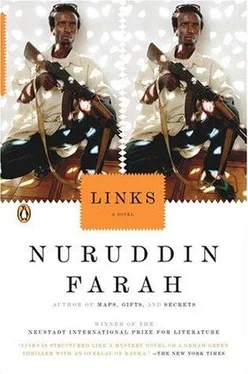What would become of him now, he wondered, as he listened to a miscellany of male voices. Af-Laawe was somewhere near, he was sure. And he was damned if he knew the purpose to all this, or where his new reality began and where it might end. But why did “they” have to resort to these crude methods?
He heard someone calling his name.
TALL, BUCKTOOTHED, THIN AS A CANE, FAAHIYE STOOD BEFORE HIM. DISSOLVING into the shadow he cast, he was as elusive as a mirror reflected in the image of its own shiftiness. Jeebleh stared up at him, and he wouldn’t take a seat. Jeebleh focused on the toothpick in the corner of Faahiye’s mouth, which his tongue was busying itself with, moving it here and there, back and forth. He had the drawn-in cheeks of a man of advanced age. Jeebleh made sure that he was seeing no visions. He thought it safe to assume that Faahiye, who had come out of hiding, should be the one to say something first.
And that was how it came to be. Faahiye took the toothpick out of his mouth and said, “I’m surprised you recognize me.”
“Where am I?” asked Jeebleh.
“I was told you’d be here.”
“Who told you that I’d be here?”
“I am not at liberty to disclose that particular detail.”
Jeebleh said, “Sit down anyhow,” and Faahiye did so. Then, because they hurt, Jeebleh closed his eyes. He took a deep breath, then exhaled, counting to thirty, and praying that he wasn’t hallucinating, seeing things and thinking weird thoughts at this most crucial moment of his visit. Faahiye sat close to him, their thighs touching, Jeebleh’s itching. How he wished he could scratch the spot! But uncertain what to make of Faahiye, he did not dare.
“We’ve all been through it!” Faahiye said.
“We’ve all been jabbed, have we?”
“Jabbed?” Faahiye asked.
“Poisoned!”
“I meant that all of us who’ve lived in this civil war have become someone other than ourselves for brief periods of time, in which we’ve entertained moments of doubt, or dropped into a deep well of despair. Have you too become someone other, in spite of yourself?”
Listening to Faahiye was working positively on him, and he was managing to take it easy, despite himself. Faahiye’s words had taken him to a comfort zone, where he didn’t mind dwelling for as long as they were in the teahouse. Jeebleh would have been the first to admit that it would be unwise to meet up with Af-Laawe, after he had been told about him; Af-Laawe would put him through a grinder, he suspected. But now he was looking at the brighter side of things: at least he had gotten to meet Faahiye, never mind his dissipated condition. Who knows, he might even get to meet Raasta and take her home shortly, back to Shanta and Bile!
“We’ve all learned to be someone other than ourselves, and have relaxed ourselves into accepting our perverse condition,” Faahiye was saying. “This makes living easier, less tedious.”
Jeebleh felt as naked as a cat with singed hair. Were Af-Laawe and his cohorts making him jump through hoops of humiliation in order to warn him that worse things were to come unless he stopped being a nuisance? His tongue was now in a tangle, in part because he didn’t know whether it was wise to confide in Faahiye. After all, if trusting Af-Laawe had gotten him to where he was now, jabbed and in pain, then where would trusting Faahiye lead him?
“I know I am someone other than myself,” Faahiye said. “At times it’s pretty hard to figure out who I am, especially when I am by myself. This gets a lot more challenging when I am with others, who are themselves others!”
“What about when you are with Raasta and Makka?”
Jeebleh felt uncomfortable, because Faahiye’s expression didn’t change at all, as if he didn’t even recognize the names of the girls. To interpret his interlocutor’s shiftiness, Jeebleh willed himself into becoming as humble and calm as the metallic silver of a mirror. This way he might make sense of the shadowy apparition moving at the deeper end of what was reflected in Faahiye’s features.
“You know it and so do I,” Faahiye said. “You become someone other than yourself when you spend many years in isolation, or live separated from those who mean a lot to you. You become someone other than yourself when you live together with your jailers, whom heaven wouldn’t admit into its courtyard, and whom hell wouldn’t deign to receive.”
“Why did you opt out?”
“I am sure you’ve heard the proverb that says that even a coward, alone and untested, thinks of himself as a brave man?”
“I know the proverb, all right,” Jeebleh said.
“I left because I thought I’d do better if I struck out on my own, away from the constraints of in-laws and so on. And because I didn’t like the false lives we lived.”
“False lives? What false lives, whose?”
“It would be unbecoming of me to name names.”
Faahiye beckoned to a waiter, who came and recited the menu of meats and pasta dishes. When he had taken Faahiye’s order, and it became obvious that Jeebleh didn’t want anything, the waiter relayed it at the top of his voice to the kitchen, about ten meters away, through an open hatch. Jeebleh drew comfort from the fact that he was meeting Faahiye in a restaurant filled with absolute strangers. Because no one there was carrying a gun — at least not openly — and no one appeared worried or frightened, Jeebleh remembered Mogadiscio as it used to be, peaceful. Not far from where they sat, several men were busy counting piles of Somali shillings, then handing them over to other men in exchange for U.S. dollars. Jeebleh guessed they were close to the Bakhaaraha market.
Faahiye continued talking. “Memory runs in awe of all that’s false, mean, and wicked. Myself, I’d ascribe my failure to adapt to life with Bile to the fact that before his arrival on the scene, Shanta and I had all the time we needed to construct a world out of dreams. I was, I must say, unprepared to live in an intimate way with Bile at the same time as having Raasta. It was all too much, too soon — I found it unhealthy, and contrived. Before his arrival, Shanta and I had dreamt dreams the size of a huge home with all its comforts, dreamt that we would enjoy our child’s love and companionship to the fullest extent. I had dreamt that I would relish being a father to Raasta, whom I hoped to rear on a diet of affection.
“We began our lives, Shanta and I, as a twosome, a loving couple, rarely raising our voices in anger at each other. We spent much of our time together, loving, bonded, tied to each other by the mutuality of our needs, the need to survive the war, which was then between the Dictator and the clan-based militias. Neither of us imagined life without the other. There was joy in our sharing of pure love, and we melted into each other. She was my barber, and devoted loving time to giving a smoother shape to my straggly toenails. I paid attention to all of her needs in every detail. We would shower together, soap each other’s bodies, and then make love.”
The waiter brought Faahiye his order, but wouldn’t go until he was paid in cash. Faahiye touched his pockets, then showed his palms, indicating that he had no money. Jeebleh offered to pay, but he had only dollars. “No problem,” the waiter assured him, and took the bill to the money changers nearby, who gave him Somali shillings.
Between mouthfuls, Faahiye continued to speak, saying that when Shanta became pregnant, both he and she felt that if she carried the pregnancy to term and gave birth to a healthy baby, then such an issue, given Shanta’s age, would be a miraculous one. “If only I could bid yesterday to return, and make it explain why Bile’s arrival changed everything, why I didn’t take to him, couldn’t stand him, and why he didn’t take to me and couldn’t stand me either. Perhaps it was because we lived on top of one another. Moreover, the civil war was entering a very tense new phase. Or maybe it was because he took over the running of our lives, ruining what prospects there were for Shanta and me to enjoy being parents to Raasta together — I don’t know!”
Читать дальше












